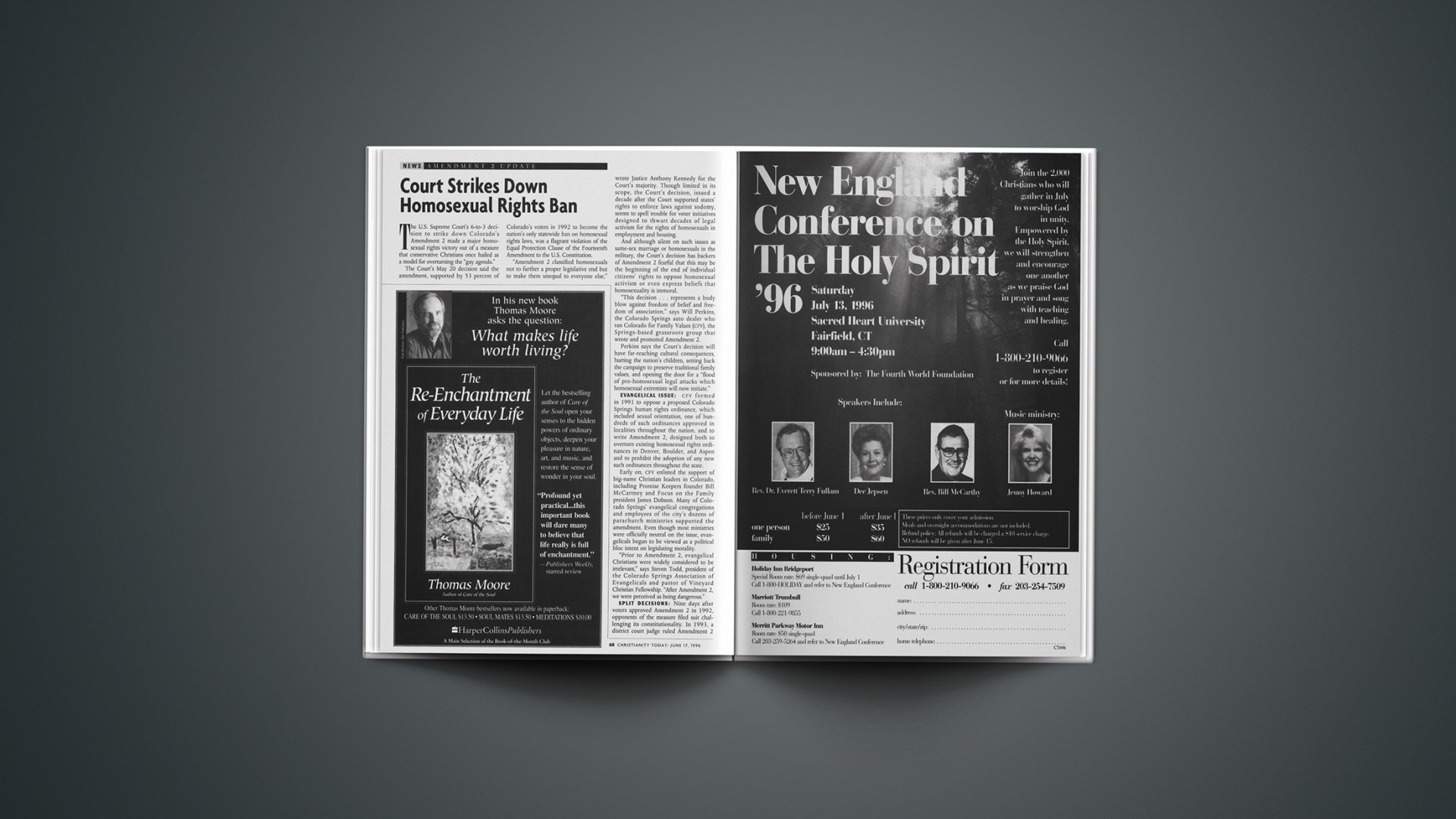The U.S. Supreme Court’s 6-to-3 decision to strike down Colorado’s Amendment 2 made a major homosexual rights victory out of a measure that conservative Christians once hailed as a model for overturning the “gay agenda.”
The Court’s May 20 decision said the amendment, supported by 53 percent of Colorado’s voters in 1992 to become the nation’s only statewide ban on homosexual rights laws, was a flagrant violation of the Equal Protection Clause of the Fourteenth Amendment to the U.S. Constitution.
“Amendment 2 classified homosexuals not to further a proper legislative end but to make them unequal to everyone else,” wrote Justice Anthony Kennedy for the Court’s majority. Though limited in its scope, the Court’s decision, issued a decade after the Court supported states’ rights to enforce laws against sodomy, seems to spell trouble for voter initiatives designed to thwart decades of legal activism for the rights of homosexuals in employment and housing.
And although silent on such issues as same-sex marriage or homosexuals in the military, the Court’s decision has backers of Amendment 2 fearful that this may be the beginning of the end of individual citizens’ rights to oppose homosexual activism or even express beliefs that homosexuality is immoral.
“This decision . . . represents a body blow against freedom of belief and freedom of association,” says Will Perkins, the Colorado Springs auto dealer who ran Colorado for Family Values (CFV), the Springs-based grassroots group that wrote and promoted Amendment 2.
Perkins says the Court’s decision will have far-reaching cultural consequences, hurting the nation’s children, setting back the campaign to preserve traditional family values, and opening the door for a “flood of pro-homosexual legal attacks which homosexual extremists will now initiate.”
EVANGELICAL ISSUE: CFV formed in 1991 to oppose a proposed Colorado Springs human rights ordinance, which included sexual orientation, one of hundreds of such ordinances approved in localities throughout the nation, and to write Amendment 2, designed both to overturn existing homosexual rights ordinances in Denver, Boulder, and Aspen and to prohibit the adoption of any new such ordinances throughout the state.
Early on, CFV enlisted the support of big-name Christian leaders in Colorado, including Promise Keepers founder Bill McCartney and Focus on the Family president James Dobson. Many of Colorado Springs’ evangelical congregations and employees of the city’s dozens of parachurch ministries supported the amendment. Even though most ministries were officially neutral on the issue, evangelicals began to be viewed as a political bloc intent on legislating morality.
“Prior to Amendment 2, evangelical Christians were widely considered to be irrelevant,” says Steven Todd, president of the Colorado Springs Association of Evangelicals and pastor of Vineyard Christian Fellowship. “After Amendment 2, we were perceived as being dangerous.”
SPLIT DECISIONS: Nine days after voters approved Amendment 2 in 1992, opponents of the measure filed suit challenging its constitutionality. In 1993, a district court judge ruled Amendment 2 unconstitutional, followed by a similar ruling by the state’s supreme court in 1994. The state appealed that decision to the U.S. Supreme Court, which heard the Romer v. Evans case last October.
Justice Kennedy said Amendment 2 granted “sweeping and comprehensive” changes in laws covering sexual orientation and discrimination, “identifying persons by a single trait and then denying them the possibility of protection across the board.” The measure, wrote Kennedy, “deprives gays and lesbians even of the protection of general laws and policies that prohibit arbitrary discrimination in governmental and private settings.”
Dissenting Justice Anthony Scalia, joined by Chief Justice William Rehnquist and Justice Clarence Thomas, took the unusual step of publicly reading his dissent, in which he criticized the Court for taking “sides in this culture war” and issuing a decision that “has no foundation in American constitutional law, and barely pretends to.”
Scalia criticized the decision as “long on emotive utterance and so short on relevant legal citation,” and said it “places the prestige of this institution behind the proposition that opposition to homosexuality is as reprehensible as racial or religious bias.”
FUTURE IMPLICATIONS: Homosexual rights organizations greeted the decision with jubilation. Suzanne B. Goldberg of the Lambda Legal Defense and Education Fund called the decision “the most important victory ever for lesbian and gay rights.”
Meanwhile, the Court’s decision is bound to slow efforts to fight homosexual rights through voter initiatives, an approach that has achieved limited success in some localities, but suffered statewide electoral losses in Maine last November and in Oregon and Idaho in 1994.
The decision may have a devastating impact on Cincinnati’s Issue 3, a measure approved by that city’s voters in 1993 and also before the U.S. Supreme Court.
For now, evangelical believers in Colorado Springs are concentrating on healing community wounds.
A loose affiliation, called the Community Concerns Group, bought a full-page ad in the city’s daily newspaper urging residents to “respond to the decision with compassion for those who disagree with it and understanding for their feelings.” Signers included Dobson and other evangelicals who supported the amendment, as well as executives from Young Life and Compassion International who had no official position.
Others are re-evaluating the long-range effectiveness of a “culture wars” approach to social issues. “There is a growing perception among many evangelical leaders here that fighting a culture war in the way this one was fought is not the best expression of the values of the kingdom of God,” says Todd of the Colorado Springs Association of Evangelicals. “That’s not to say there isn’t an extreme agenda on the other side, but we were fighting on the wrong battlefield, and we were mistaking who the enemy was.”
Copyright © 1996 Christianity Today. Click for reprint information.










